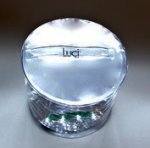We’ve covered a variety of solar powered lamps created primarily for developing countries and in disaster zones, including Luminaid, Solar Pebble and the Australian-designed Mandarin Solar Light. All have their unique facets and LUCI is also a little different.
Created by Micro Power Design – MpowerD – LUCI combines the functionality of a hanging lamp and a portable light, but is also foldable for travel and can be carried in a pocket.
The light can sufficiently illuminate a just over a square meter. This may not sound like much; but it’s comparable to a small kerosene lamp – and without the carbon and soot emissions; plus the toxic fumes that threaten so many in developing nations where kerosene-based lighting is widely used.
LUCI contains 8 white Light Emitting Diodes (LED’s) and has three lighting levels to conserve battery life. The incorporated solar panel recharges 80% of its lithium ion battery pack in just over 4 hours of direct sunlight and the light can be charged while folded or expanded. A full charge provides 12 hours of light.
To many of us, a single low powered light is nothing to get excited about; but in developing nations these items can make such a difference. They can help increase productivity, provide extra time for children to study, are a personal security tool and can even improve health care.
With annual kerosene costs reaching up to $300 a household and often consuming a third of a household’s income; LUCI is comparatively cheap at $10. As with other cheap solar lights, the challenge is households having the money at any given time to buy a light; so many of these projects are provided funding to subsidise distribution.
10,000 of these lanterns will be heading to Haiti soon and the development of LUCI is also being supported by Sir Richard Branson.
One nagging concern about all these different lamps – as wonderful as they are – is what happens after their serviceable life ends. Many appear to have no replaceable parts; so in a few years from now, millions could potentially wind up as trash. Perhaps this presents an opportunity for budding entrepreneurs in developing countries to build businesses based on the repair, reconditioning and recycling of solar lights.
Learn more about LUCI.












































